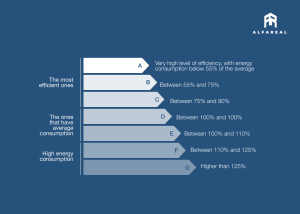Did you know that 40% of the energy and raw materials used in the world are consumed by the real estate sector?
In this post, we’ll talk about energy efficiency, a crucial issue for the housing and Coliving industries. In keeping with our dedication to sustainability, we encourage education and the adoption of ethical habits. The real estate sector has been slower to implement better sustainable initiatives despite having a high worldwide energy consumption.
We will look at how renewable energy sources and consumption tracking could serve as the cornerstones of energy efficiency in Coliving projects and single-family houses.
What is a home’s energy efficiency?
Energy efficiency is the capacity to maximize advantages while optimizing the usage of energy in a home. Energy-saving devices and practices aim to lower the amount of energy required to keep a home at a comfortable temperature. This is accomplished by putting in place systems that use renewable energy sources and work to eliminate energy losses. Energy efficiency also encourages wise resource management. To reduce excessive energy usage, examples of this include the installation of photovoltaic solar panels, the use of LED lighting, thermal insulation, and automation systems.
For both homeowners and the environment, having an energy-efficient home has several benefits. Long-term financial savings are produced along with a reduction in greenhouse gas emissions by using less energy. This helps make a house more economically and environmentally sustainable.
We also observe that energy effectiveness and sustainability are closely associated in the real estate industry. Implementing efficient procedures in housing developments helps minimize environmental effects and encourages a more conscientious way of life, whether in Coliving spaces or single-family houses. By putting into practice measures like the construction of renewable energy systems, effective thermal insulation, and consumption control systems, there is a synergy between energy efficiency and sustainability.
The importance of energy efficiency increases when considering Coliving spaces. For instance, pooling resources promotes the usage of more environmentally friendly routines. Shared usage of bicycles, electric automobiles, and other modes of mobility lowers the consumption of fossil fuels and pollutants. In addition, the sharing of materials, equipment, and appliances within a Coliving community lessens the need for new product purchases, which decreases waste and waste output.
Numerous programs and tools are available in Coliving projects to make it easier to calculate and monitor energy efficiency. These technologies make it possible to assess and compare energy usage, pinpoint problem areas, and keep a close eye on a project’s energy efficiency. These resources support Coliving project managers in managing and improving energy design and usage, thus promoting sustainability and energy efficiency in Coliving spaces.
How can I get an energy efficiency certificate for my house?
It takes a series of processes to assure the assessment and classification of a home’s energy use in order to receive an energy efficiency certificate. As a homeowner, you must consult a professional to perform a comprehensive investigation of the property, such as an architect or engineer. This study looks at energy use in relation to things like insulation, HVAC systems, lighting, and other things. This is taken care of at Alfareal through our Coliving projects.
The technician will provide an energy efficiency certificate with a designation ranging from category A to category G once the research is finished. This badge provides helpful information to both homeowners and prospective purchasers or tenants by clearly and graphically displaying the degree of energy efficiency of a home.

The certificate needs to be renewed after its 10-year expiration date. It is vital to emphasize the need of maintaining the home’s energy efficiency because the updated certificate takes into account any potential modifications and advancements in energy consumption achieved over time.
How can you make your home’s energy efficiency improve?
The first step in increasing the energy efficiency of your home is to think about more environmentally friendly and effective heating solutions. Because they produce heat using renewable energy from the air or the earth, heat pumps are a common choice. These systems provide effective performance and much lower energy consumption when compared to conventional systems. On the other side, radiant heating entails the installation of radiant panels or floors that disperse heat. By preventing heat loss through convection and keeping the ambient temperature lower, this technique uses less energy.
Based on the project’s size and design, Alfareal takes care of the heating requirements in Coliving areas. More sustainable and comfortable spaces can be created by combining effective heating technologies, like the ones outlined above, with strong thermal insulation and effective energy control.
The variety of incentives and support available to increase energy efficiency in homes should be taken into account as a second step. These subsidies and initiatives offer information on how to improve HVAC systems, put thermal insulation in place, swap out old windows for more energy-efficient ones, and put renewable energy systems in place.
It is critical to be informed of the programs offered in each place because the conditions and scope of these grants differ by location. The organizations in charge of managing these funds can give comprehensive information on the prerequisites, deadlines, and application processes.
Tax returns can also be used to apply tax deductions and economic benefits, which encourage investing in home energy efficiency upgrades. These expenses can be written off if you buy energy-efficient equipment, hire professionals to carry out energy studies, or get energy efficiency certificates.
Conclusion
In conclusion, homes must be more energy-efficient in order to increase sustainability in the real estate industry. The significance of energy efficiency in housing, its connection to sustainability, and its advantages have all been emphasized in this essay. We have also looked at how to get energy efficiency certificates, grants and support programs that are accessible, and more environmentally friendly heating systems.
Alfareal is dedicated to sustainability and energy efficiency in all of its projects, and we work to set the standard for the industry. We can promote a housing future that is both financially advantageous for our projects and environmentally ethical by developing more sustainable Coliving places.

